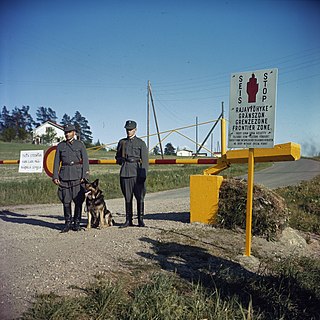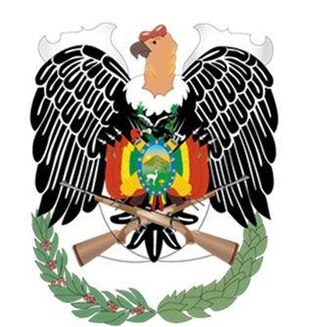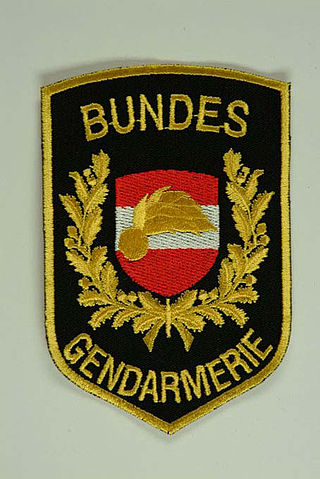
The Djibouti Armed Forces are the military forces of Djibouti. They consist of the Djiboutian National Army and its sub-branches the Djiboutian Air Force and Djiboutian Navy. As of 2018, the Djibouti Armed Forces consists of 20,470 ground troops, which are divided into several regiments and battalions garrisoned in various areas throughout the country. The Djibouti Armed Forces are an important player in the Bab-el-Mandeb and Red Sea.

A coast guard or coastguard is a maritime security organization of a particular country. The term embraces wide range of responsibilities in different countries, from being a heavily armed military force with customs and security duties to being a volunteer organization tasked with search and rescue without law enforcement authority. In most countries, a typical coast guard's functions are distinct from those of the navy and the transit police, while in certain countries they have similarities to both.

The People's Armed Police Force is a Chinese paramilitary organization primarily responsible for internal security, riot control, counter-terrorism, disaster response, law enforcement and maritime rights protection as well as providing support to the People's Liberation Army (PLA) during wartime.

Military police (MP) are law enforcement agencies connected with, or part of, the military of a state. In wartime operations, the military police may support the main fighting force with force protection, convoy security, screening, rear reconnaissance, logistic traffic management, counterinsurgency, and detainee handling.

A gendarmerie is a military force with law enforcement duties among the civilian population. The term gendarme is derived from the medieval French expression gens d'armes, which translates to "men-at-arms". In France and some Francophone nations, the gendarmerie is a branch of the armed forces that is responsible for internal security in parts of the territory, with additional duties as military police for the armed forces. It was introduced to several other Western European countries during the Napoleonic conquests. In the mid-twentieth century, a number of former French mandates and colonial possessions adopted a gendarmerie after independence.
Commandant is a title often given to the officer in charge of a military training establishment or academy. This usage is common in English-speaking nations. In some countries it may be a military or police rank. It is also often used to refer to the commander of a military prison or prison camp.

Law enforcement in France is centralized at the national level. Recently, legislation has allowed local governments to hire their own police officers which are called the police municipale.

The Royal Marechaussee also translated as the Royal Military Constabulary, is the national gendarmerie force of the Netherlands, performing military and civilian police duties. It is also one of the two national police forces in the Netherlands, alongside the National Police Corps, and is one of the four branches of the Netherlands Armed Forces.

A border guard of a country is a national security agency that ensures border security. Some of the national border guard agencies also perform coast guard and rescue service duties.

The Jandarmeria Română is the national Gendarmerie force of Romania, tasked with high-risk and specialized law enforcement duties. It is one of the two main police forces in Romania, both having jurisdiction over the civilian population.

Law enforcement in Bolivia is reliant on the 40,000-member Cuerpo de Policía Nacional responsible for internal security and maintaining law and order. Unlike many South American countries, the Bolivian police force always has been accountable to the national government rather than to state or local officials. The 1950 Organic Law of Police and Carabiniers officially separated the police from the military. Frequently, however, the national police call upon the military for assistance in quelling riots and civil protests.

The National Gendarmerie is one of two national law enforcement forces of France, along with the National Police. The Gendarmerie is a branch of the French Armed Forces placed under the jurisdiction of the Ministry of the Interior, with additional duties from the Ministry of Armed Forces. Its responsibilities include policing smaller towns, suburbs and rural areas, crowd and riot control, and criminal investigation, including cybercrime. By contrast, the National Police is a civilian law enforcement agency that is in charge of policing cities and larger towns. Because of its military status, the Gendarmerie also fulfills a range of military and defence missions. The Gendarmerie has a strength of around 102,269 people.

Law enforcement in Turkey is carried out by several departments and agencies, all acting under the Ministry of Internal Affairs except military police which is under the command of the Turkish Armed Forces and the National Intelligence Organization which directly reports to the president.
This is the history of the Colombian National Police. For further reading, see history of Colombia.

Provosts are military police (MP) whose duties are policing solely within the armed forces of a country, as opposed to gendarmerie duties in the civilian population. However, many countries use their gendarmerie for provost duties.

The Federal Gendarmerie was an Austrian federal police agency. It was responsible for approximately two thirds of the population on approximately 98% of Austrian national territory, alongside the Federal Safety Guard Corps (Bundessicherheitswachekorps) and Detective Corps (Kriminalbeamtenkorps). All Austrian law enforcement agencies were merged into the Federal Police (Bundespolizei) agency, with effect from 1 July 2005.
The Romanian Military Police is the military police of the Romanian Armed Forces. It was formed in 1990, immediately after the Romanian Revolution, although the Romanian Gendarmerie performed military police duties between 1850 and 1949.

In many countries, particularly those with a federal system of government, there may be several law enforcement agencies, police or police-like organizations, each serving different levels of government and enforcing different subsets of the applicable law.

The National Guard Forces Command of the Russian Federation is the operational gendarmerie component of the National Guard of Russia, created through a presidential decree on April 5, 2016. Functionally, it is a gendarmerie organized along paramilitary lines with a mission to ensure public order, national security and defense against terrorism. To this end, Forces Command handles the operational units of the National Guard, including its rapid deployment branch, the Separate Operational Purpose Division (ODON); and its naval branch, the National Guard Naval Service Corps.
















